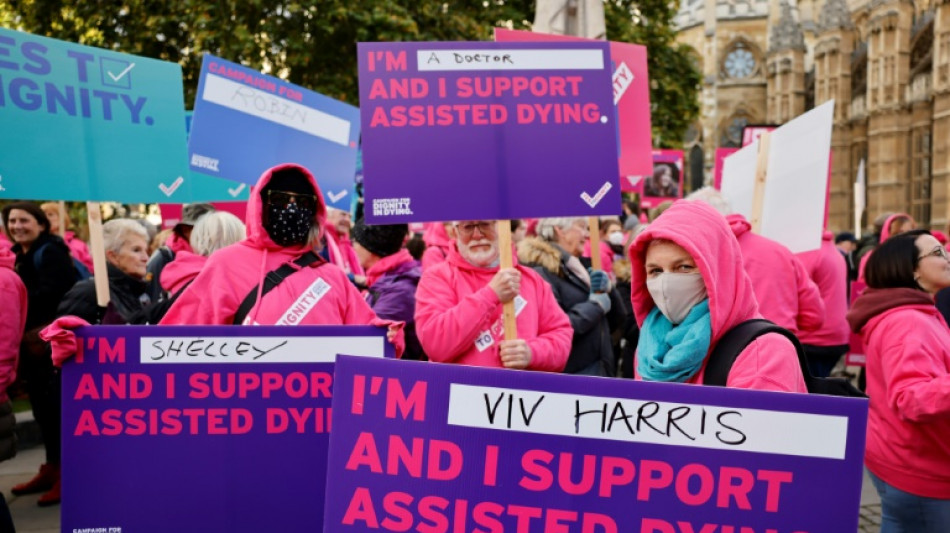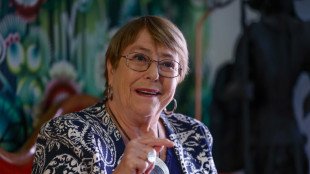
-
 Sunderland rout hapless Burnley
Sunderland rout hapless Burnley
-
Costa Rican president-elect looks to Bukele for help against crime

-
 Hosts Australia to open Rugby World Cup against Hong Kong
Hosts Australia to open Rugby World Cup against Hong Kong
-
New York records 13 cold-related deaths since late January

-
 In post-Maduro Venezuela, pro- and anti-government workers march for better pay
In post-Maduro Venezuela, pro- and anti-government workers march for better pay
-
Romero slams 'disgraceful' Spurs squad depth

-
 Trump urges 'no changes' to bill to end shutdown
Trump urges 'no changes' to bill to end shutdown
-
Trump says India, US strike trade deal

-
 Cuban tourism in crisis; visitors repelled by fuel, power shortages
Cuban tourism in crisis; visitors repelled by fuel, power shortages
-
Liverpool set for Jacquet deal, Palace sign Strand Larsen on deadline day

-
 FIFA president Infantino defends giving peace prize to Trump
FIFA president Infantino defends giving peace prize to Trump
-
Trump cuts India tariffs, says Modi will stop buying Russian oil

-
 Borthwick backs Itoje to get 'big roar' off the bench against Wales
Borthwick backs Itoje to get 'big roar' off the bench against Wales
-
Twenty-one friends from Belgian village win €123mn jackpot

-
 Mateta move to Milan scuppered by medical concerns: source
Mateta move to Milan scuppered by medical concerns: source
-
Late-January US snowstorm wasn't historically exceptional: NOAA

-
 Punctuality at Germany's crisis-hit railway slumps
Punctuality at Germany's crisis-hit railway slumps
-
Gazans begin crossing to Egypt for treatment after partial Rafah reopening

-
 Halt to MSF work will be 'catastrophic' for people of Gaza: MSF chief
Halt to MSF work will be 'catastrophic' for people of Gaza: MSF chief
-
Italian biathlete Passler suspended after pre-Olympics doping test

-
 Europe observatory hails plan to abandon light-polluting Chile project
Europe observatory hails plan to abandon light-polluting Chile project
-
Iran president orders talks with US as Trump hopeful of deal

-
 Uncertainty grows over when US budget showdown will end
Uncertainty grows over when US budget showdown will end
-
Oil slides, gold loses lustre as Iran threat recedes

-
 Russian captain found guilty in fatal North Sea crash
Russian captain found guilty in fatal North Sea crash
-
Disney earnings boosted by theme parks, as CEO handover nears

-
 Sri Lanka drop Test captain De Silva from T20 World Cup squad
Sri Lanka drop Test captain De Silva from T20 World Cup squad
-
France demands 1.7 bn euros in payroll taxes from Uber: media report

-
 EU will struggle to secure key raw materials supply, warns report
EU will struggle to secure key raw materials supply, warns report
-
France poised to adopt 2026 budget after months of tense talks

-
 Latest Epstein file dump rocks UK royals, politics
Latest Epstein file dump rocks UK royals, politics
-
Arteta seeks Arsenal reinforcement for injured Merino

-
 Russia uses sport to 'whitewash' its aggression, says Ukraine minister
Russia uses sport to 'whitewash' its aggression, says Ukraine minister
-
Chile officially backs Bachelet candidacy for UN top job

-
 European stocks rise as oil tumbles, while tech worries weigh on New York
European stocks rise as oil tumbles, while tech worries weigh on New York
-
England captain Itoje on bench for Six Nations opener against Wales

-
 Rahm says golfers should be 'free' to play where they want after LIV defections
Rahm says golfers should be 'free' to play where they want after LIV defections
-
More baby milk recalls in France after new toxin rules

-
 Rosenior will not rush Estevao return from Brazil
Rosenior will not rush Estevao return from Brazil
-
Mercedes ready to win F1 world title, says Russell

-
 Germany hit by nationwide public transport strike
Germany hit by nationwide public transport strike
-
Barca coach Flick 'not happy' with Raphinha thigh strain

-
 WHO chief says turmoil creates chance for reset
WHO chief says turmoil creates chance for reset
-
European stocks rise as gold, oil prices tumble

-
 Rink issues resolved, NHL stars chase Olympic gold at Milan
Rink issues resolved, NHL stars chase Olympic gold at Milan
-
S. Korea celebrates breakthrough K-pop Grammy win for 'Golden'

-
 Rodri rages that officials 'don't want' Man City to win
Rodri rages that officials 'don't want' Man City to win
-
Gaza's Rafah crossing makes limited reopening after two-year war

-
 African players in Europe: Ouattara dents Villa title hopes
African players in Europe: Ouattara dents Villa title hopes
-
Liverpool beat Chelsea to Rennes defender Jacquet - reports


UK assisted dying bill hopes to end 'inhumane' suicides
Molly Meacher's voice quivers with emotion as she tells how her aunt took her own life after her liver cancer tumour grew to the size of a football.
"One night, she took a whole lot of pills and whisky, and her husband found her dead in the morning," said Meacher, a member of British parliament's upper House of Lords.
"It seemed to me terribly sad that somebody would end their life alone in the middle of the night without even their dear husband knowing that this was what they were doing," she told AFP.
Meacher, 81, has drafted a law to legalise assisted dying in England for the terminally ill with less than six months to live, an act currently punishable by up to 14 years in prison.
"It just was clear to me that this was just inhumane. You wouldn't treat a dog or a cat like that. But we treat our own people like that," said the former social worker.
The UK parliament examined the question of assisted dying in 2015 and decided against legalising it, but since then other countries have decided to approve what many see as an act of mercy.
"Things are moving in the right direction, there are a number of British Isles jurisdictions that are looking at changing the law," said Sarah Wootton, head of the Dignity in Dying campaign group.
- 'Discriminatory' -
Last September, the influential British Medical Association ended its opposition to "physician-assisted dying", taking the "historic step" of adopting a neutral position.
According to a poll by YouGov, 73 percent of Britons questioned in August said that doctors should be able to help terminally ill patients die.
By contrast, only 35 percent of MPs approved.
Campaigner Alex Pandolfo says the law "needs changing immediately (because) of the discriminatory practice that takes place in this country".
"It actually exists already for the privileged," says Pandolfo, in his 60s and terminally ill with Alzheimer's.
If you have £10,000 (about 12,000 euros, 13,500 dollars) for flights, hotels and food, you can go to a country such as Switzerland to die, he said.
Pandolfo has already booked his assisted death at a Swiss clinic and in recent years has accompanied around 100 Britons to die in Switzerland.
But he would rather die in England, to be near loved ones and allow them to have a more natural grieving process.
"I'm in no hurry," he jokes, saying he was given "a death sentence" in 2015.
"I am already dying of a condition that I've got no control over," he said.
"All I'm asking for is somebody to assist me with that death when it will be unbearable, to accelerate things. It's a rational act."
Sitting on his sofa in Lancaster, northwest England, the white-haired Pandolfo says his illness has already had a "massive impact" on his quality of life.
It affects his memory, movement, ability to speak and drive, and watch a football match.
As a result, he would never qualify for assisted dying under the terms of the draft law before parliament, which he says is "extremely restricted".
"By the time I've got six months to live, I won't have capacity to say that I want assisted dying," he said.
- 'Unacceptable pressure' -
Meacher said her bill's restrictions are "a political decision based on realities" in a "fairly conservative country", particularly where religious leaders and the faithful are involved.
"It's pretty hard to get a bill through parliament with these rather narrow limits," she said.
The Archbishop of Canterbury, Justin Welby, told parliament that euthanasia could expose the most vulnerable to unacceptable pressure to die from some "loved ones".
Welby, the most senior cleric in the worldwide Anglican communion, also told the BBC that "sadly people make mistakes in their diagnosis".
Meacher's bill "has done a great job at raising the issue," said Wootton.
While it will not necessarily become law a similar bill before the Scottish Parliament has much more chance of success "within a year-and-a-half", she said.
"It will be very difficult for medical regulators to have something lawful in one part of the country and not lawful in other parts of the country.
"I think that's an unsustainable situation in the long term."
Similar draft laws are being looked at in the self-governing Crown dependencies of Jersey and the Isle of Man.
Even strictly Roman Catholic neighbour Ireland is studying the possibility of euthanasia, giving people like Pandolfo a measure of hope.
Once he had his place booked in Switzerland, Pandolfo said: "I stopped worrying about dying and suffering and started focusing and concentrating on enjoying what life can."
J.Bergmann--BTB

